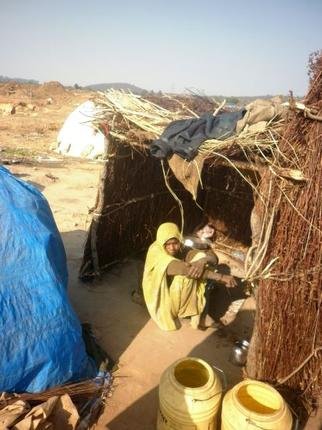Kols in UP: A life without rights (The Hindu)
“Though the Kols are anthropologically tribal, they are recognized as a Scheduled Caste in Uttar Pradesh. Not only has this deprived them of their traditional source of living–the forest, it has largely left them dependant and landless, languishing in silica quarries and sand mines. [...]
“Landless and dismayed by the rocky terrain that makes cultivation difficult, the Kols settle down close to silica mines, crushing stones for much of the day and bearing a nomadic existence. Over the years, a large number have contracted lung diseases like silicosis and tuberculosis. Some have lost limbs or sustained crippling injuries during the blasting of the rocks. [...]
“In most cases, the landlords provide the Kols space to work and live, and in return deduct portions from their silica mining. Kol women are also invited to serve as domestic help for no or minimum remuneration. They often endure the most of police apathy, with reports of them facing sexual harassment and violence going unheard or unreported. ‘When we go with complaints, we are shooed away and asked to come back later,’ says Indu Kol.
“However, the Kol’s most grim concern remains the forest department’s restrictions on the use of forest produce. Generally, they require permission to plant or use trees such as neem, amla and mahua. The Kols complain that they face harassment from the authorities even if they collect the twigs and barks and sell them. According to Amarnath Kol, who works with a local Kol organization, at least eight Kols have been booked by the forest department for carrying wood for sale. [...]
“Today, Kols are mostly followers of Hinduism. They claim their descent from Shabari, who in the forests of modern day Chattisgarh fed berries to Lord Ram and Lord Lakshman during their exile. As the legend suggests, the Kols have a close relationship with the forest.
“This bond was disrupted in the 19th century by the British East India Company, which indulged in deforestation and introduced zamindari to extract revenue from their forests lands. The Kols protested violently, in what is known as the Kol Rebellion (1831-32), where a British Major is said to have noted their ‘courage and daring.’”

Comments